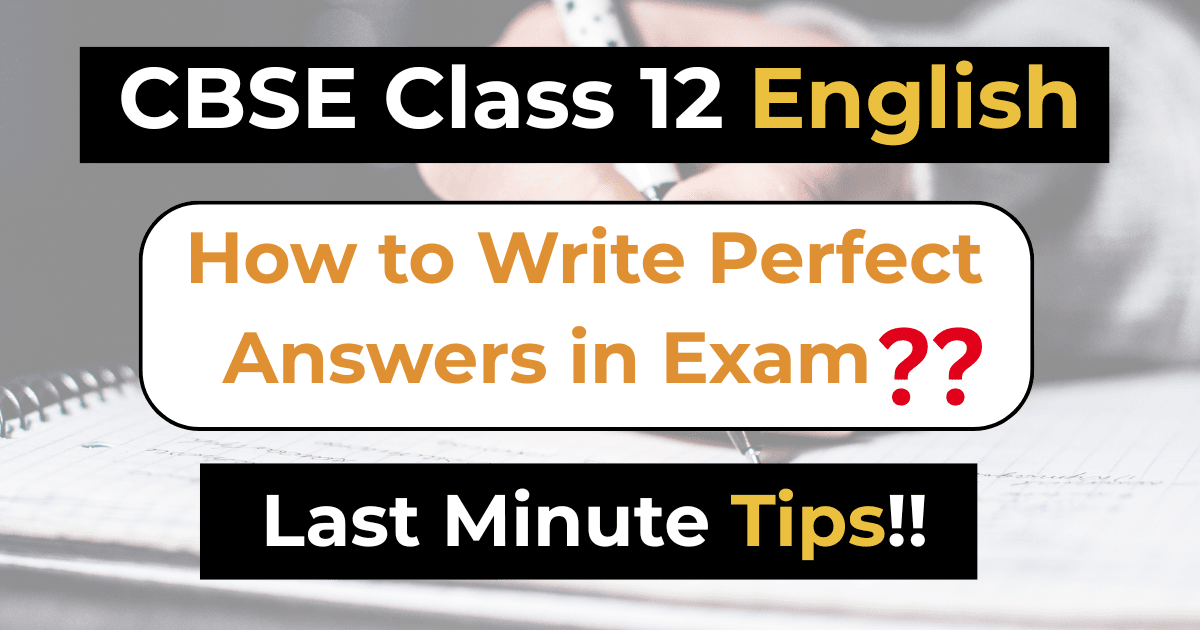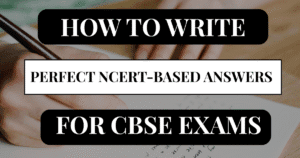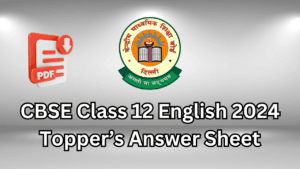English is tricky. You don’t fail, but you don’t top either. It’s that one paper where you write pages and still lose marks without knowing why. The secret? CBSE doesn’t just check what you know, but how you present it.
Many students know the syllabus but still lose marks because their answers don’t match the examiner’s expectations. Writing a “perfect answer” in English isn’t about fancy vocabulary or memorizing guides; it’s about clarity, structure, and exam-smart strategies.
In this blog, we’ll break down how you can master each section of the paper, avoid common mistakes, and present your answers in a way that impresses the examiner. Think of it as a complete roadmap to help you walk into the exam hall with confidence.
Understanding the CBSE Class 12 English Exam Pattern
| Component | Details |
| Total Marks | 100 |
| Theory Paper | 80 marks (3 hours) |
| Internal Assessment | 20 marks |
| Sections in Theory | Section A – Reading Skills (22 marks) Section B – Creative Writing Skills (18 marks) Section C – Literature (40 marks) |
Note: Knowing the distribution helps you plan your answers and avoid overwriting or skipping.
Detailed Syllabus Breakdown of CBSE Class 12 English Exam
Here's the detailed syllabus breakdown of the CBSE Class 12 English exam, section-wise:
Section A – Reading Skills (22 Marks)
| Type | Details |
| Unseen Passage | Tests understanding, interpretation, analysis, inference, and vocabulary. Passage may be literary, descriptive, or factual. |
| Case-based Passage | Factual passage with verbal & visual inputs (charts/statistical data). Tests analysis, inference, and evaluation. |
| Note | Combined word limit: 700–750 words. Questions include MCQs, objective, and short answers (40–50 words). |
Section B – Creative Writing Skills (18 Marks)
| Question Type | Word Limit | Marks Distribution |
|---|---|---|
| Notice Writing | Up to 50 words | 4 Marks (Format: 1, Content: 2, Grammar: 1) |
| Formal/Informal Invitation & Reply | Up to 50 words | 4 Marks (Format: 1, Content: 2, Grammar: 1) |
| Letters (Applications, Editor, Job Resume, etc.) | 120–150 words | 5 Marks (Format: 1, Ideas: 1, Content: 2, Grammar: 1) |
| Article/Report Writing | 120–150 words | 5 Marks (Format: 1, Ideas: 1, Content: 2, Grammar: 1) |
Section C – Literature (40 Marks)
| Question Type | Details | Marks |
| Poetry Extract | From Flamingo – comprehension, analysis, inference, appreciation | 6 |
| Prose Extract (Vistas) | Comprehension, analysis, evaluation, appreciation | 4 |
| Prose Extract (Flamingo) | Comprehension, analysis, inference, evaluation | 6 |
| Short Answer Questions (Flamingo – Prose & Poetry) | 40–50 words, critical and inferential | 10 (5×2) |
| Short Answer Questions (Vistas) | 40–50 words, inferential | 4 (2×2) |
| Long Answer Question (Flamingo) | 120–150 words, extrapolation, critical analysis | 5 |
| Long Answer Question (Vistas) | 120–150 words, evaluative/analytical response | 5 |
Section A: Reading Skills (22 Marks)
This section checks how well you can comprehend, interpret, and analyze information.
Tips for Discursive Passage
- Skim first, read later: Quickly glance through the passage to get the main idea before reading the questions.
- Underline keywords: Focus on facts, dates, and strong adjectives.
- Crisp answers: Keep responses to 40–50 words; no need to copy entire lines. Use your own words.
Tips for Case-based Factual Passage
- Pay attention to charts, statistics, and headings.
- Look for direct answers in the data provided.
- Don’t explain unnecessarily, just stick to facts.
Tip: Practice at least 10–15 comprehension exercises from sample papers. It trains you to read fast and write precise answers.
Section B: Creative Writing Skills (18 Marks)
This is where neatness, correct format, and adherence to the word limit matter most.
Notice Writing (4 Marks)
- Keep it within 50 words.
- Stick to the format: Name of Institution – NOTICE – Date – Title – Content – Signature with designation.
- Be brief, clear, and formal.
Invitations & Replies (4 Marks)
- Formal invitations must sound polite and professional.
- Stick to 50 words.
- For replies, always acknowledge the invitation and clearly state acceptance or regret.
Letters (5 Marks)
- Can include job applications, editorials, or formal requests.
- Structure: Sender’s Address → Date → Receiver’s Address → Subject → Salutation → Body → Closing.
- Keep paragraphs short and focused.
Also See: How to Write Application for Job with Biodata Class 12
Articles/Reports (5 Marks)
- 120–150 words.
- Begin with an engaging opening line.
- Maintain a 3-part structure: Introduction → Body → Conclusion.
- Use facts, quotes, or examples for authenticity.
Golden Rule: Examiners award full marks when the format is correct, ideas are clear, and grammar is error-free.
Section C: Literature (40 Marks)
Here, examiners expect more than summaries; they look for analysis, interpretation, and insight.
For Extract-based Questions
- Quote 1–2 words/phrases from the extract in your answer.
- Don’t just explain, connect it to the theme, character, or message.
Short Answer Questions (40–50 words)
- Be concise. Avoid rewriting the whole story.
- Directly address the question (theme, character, moral, etc.).
- Example: If asked about a character’s decision, focus on motivation and outcome, not the entire plot.
Long Answer Questions (120–150 words)
- Use a mini-essay format:
- Introduction: 1–2 lines about the context.
- Body: Explain with examples, quotes, or references.
- Conclusion: Reconnect with the theme or broader relevance.
- Keep arguments logical and avoid unnecessary retelling.
Preparation Hack: Make theme-wise notes for Flamingo & Vistas. This makes revision before exams much faster.
Also See: CBSE Class 12 Half-Yearly Exam 2025 – 7 Last-Minute Study Hacks
I know the stories and poems, but I just can’t frame answers properly. How do I overcome this?
It’s normal to feel stuck. Instead of memorizing full answers, focus on keywords, author names, and central themes. Then practice framing short 3–4 line answers daily. This builds confidence and structure.
I’m scared that my answers will look too short. Will the examiner cut marks for this?
Length isn’t everything. What matters is relevance and clarity. A crisp, well-structured 6–7 line answer often fetches more marks than a full-page filled with repetition.
I panic when I see the question paper. How do I manage my time and stress?
First, take 5 minutes to scan the paper. Attempt the section you’re most confident in. Divide your time section-wise (e.g., 40 min literature, 40 min reading, 1 hr writing). Leave 10–15 min for revision.
What if I don’t remember the exact line from the text? Will I lose marks?
No! Quoting lines is great, but not compulsory. Explaining the idea in your own words with correct context is more important.
My handwriting is not very good. Will it affect my marks?
Don’t worry about calligraphy—just make it readable. If your letters are clear and spacing is proper, examiners won’t cut marks.
I feel weak in the “Writing Section” (letters, articles, reports). How can I improve quickly?
Practice with a template. Memorize the format (address, salutation, conclusion, etc.), then practice 2–3 questions daily. With structure fixed in your head, you’ll save time and avoid silly mistakes.
I always run out of time in English exams. Any tips?
Yes—don’t spend too much time on one section. Write within the word limit, don’t over-explain. Practice solving full sample papers in 3 hours at home to build speed.
General Answer Writing Tips to Ace the Class 12 English Exam
- Presentation matters: Leave a line after each answer to make them look neat & clear, and underline the important keywords.
- Time management:
- Reading Section – 40 minutes
- Writing Section – 50 minutes
- Literature Section – 80 minutes
- Revision – 10 minutes
- Clarity over length: A well-structured short answer scores better than a long, messy one.
- Grammar & spelling: Even minor mistakes cost marks, especially in writing tasks.
- Stick to the word limit: Writing way beyond the limit won’t fetch extra marks, but it will eat into your time.
- Answer what’s asked: Don’t overwrite or drift off-topic. Keep answers focused on the question.
- Use simple language: Clear and straightforward writing is always better than complex words you’re unsure of.
- Highlight with examples: In literature answers, add short, relevant quotes or references to strengthen your point.
- Maintain handwriting: Even if your content is good, untidy writing can irritate the examiner. Keep it clear to read.
- Stay calm during tough questions: Attempt what you know first; come back to the difficult ones later.
Preparation Strategy Before Exam
- Solve Previous Year Papers: Familiarize yourself with recurring question types.
- Practice Formats: Notices, letters, and reports follow strict patterns; don’t miss out on easy marks.
- Revise Literature in Layers: First read summaries, then move to character analysis, then themes. For your convenience, here are a list of chapter-wise important questions.
- Timed Practice: Try solving a full paper at least twice before the actual exam, just like you would on exam day.
Closing Thoughts
Writing perfect answers in CBSE Class 12 English isn’t about memorizing lines; it’s about expressing ideas clearly, following structure, and managing time smartly. If you keep your answers crisp, neat, and analytical, you’ll not only score well but also feel more confident walking out of the exam hall.
Remember: in English, less is often more, as long as it’s precise and well-organized. Stick to the strategies above, practice regularly, and you’ll turn English into one of your strongest scoring subjects in the 2025–26 board exams.



